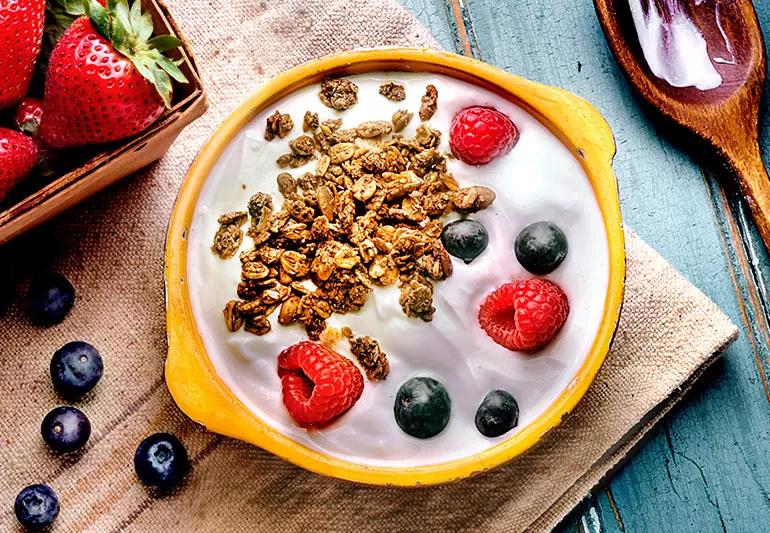Antioxidants pose no risk to your health, only rewards

Antioxidants are one of those things you hear a lot about. Whether it’s from a healthcare provider or in advertising, there’s no getting around all the chatter about antioxidants and how important they are.
Advertisement
Cleveland Clinic is a non-profit academic medical center. Advertising on our site helps support our mission. We do not endorse non-Cleveland Clinic products or services. Policy
But what are antioxidants? And why are they so important? To get to the bottom of all the buzz, we spoke with registered dietitian Nicole Hopsecger, RD, LD.
“Antioxidants are naturally occurring chemicals in foods that can serve as a defense against free radicals,” explains Hopsecger. “Free radicals are normal byproducts of metabolism that occur in our bodies or can be a result of environmental factors, like air contamination and smoke.”
The primary benefit of antioxidants is their ability to safely react with free radicals before damage can be done on a cellular level. Basically, “Antioxidants fight free radicals,” she says.
“Free radicals can damage the body’s cells by changing a cell’s DNA, or it can alter a cell’s membrane,” she explains. “This interaction between free radicals and the body is called oxidative stress, which is often thought to be what contributes to the increased risk of developing chronic disease.”
Hopsecger says that while fighting free radicals is the primary benefit of antioxidants, there is a secondary benefit.
“Indirectly, antioxidants help reduce the risk of chronic disease development because they negate those free radicals from causing havoc to our cells.”
Advertisement
While our bodies naturally produce some antioxidants, certain foods are the best way to ensure you’re getting enough antioxidants.
Some examples of antioxidants and the foods (and vitamin sources) in which you can find them, according to Hopsecger, include:
Like many healthcare providers, Hopsecger recommends a “rainbow diet” to ensure you’re getting all the necessary nutrients your body needs.
A rainbow diet means eating fruit and vegetables of different colors like green (broccoli or spinach), red (tomatoes or strawberries), orange (carrots or oranges) and yellow (bell peppers or banana). This ensures you consume a wide range of vitamins, nutrients and, yes, antioxidants.
While antioxidants are very good for your health, there are misconceptions about them and confusion on how best to make them part of your diet.
“We can’t rely on any single antioxidant or nutrient to do all the work,” Hopsecger says. “We need to get a variety of those to make sure we stay healthy and the best way to do that is through a healthy, balanced and varied diet.”
Each antioxidant behaves differently in our body, and no antioxidant can do all the work of several different ones. On a similar note, she adds that the idea of a “superfood” that can supply a higher level of nutrients than others is a bit of a misnomer.
“Superfoods tend to be tied more to a marketing trend,” she explains, noting that both kale and avocados have experienced booms in popularity in recent years. And while those foods are healthy, it’s more important to make sure you’re getting a variety of foods in your diet — like that rainbow diet — than focusing on any one particular food too much.
While getting antioxidants into your body is good, doing so through supplements may not be. “Studies are inconclusive about whether or not supplements actually help, or in some cases, cause more harm than benefit,” Hopsecger shares.
“Not only can these interact with medications you’re already taking, but you’re also not getting a well-rounded variety, particularly if you’re mega-dosing a single one,” she continues. “And those single antioxidants may not work as well without the presence of other nutrients you get more naturally through a well-balanced diet.”
Advertisement
It’s always best to get your vitamins and minerals, including antioxidants, through food.
Advertisement
Learn more about our editorial process.
Advertisement

The tropical fruit is a good source of antioxidants and vitamin C

High amounts of cholesterol and saturated fat in red meat may be linked to heart disease

The leaves and pods from this tree are rich in essential nutrients

This starchy root vegetable is a staple in many global cuisines — but it has to be prepared correctly, or it can cause serious concerns

These delicate green sprouts can give you an extra dose of vitamin K and other nutrients — but they’re not safe for everyone

Edamame, lentils and chicken breast are good sources of protein

Eating this root vegetable can help support your eye, heart and brain health

The flavorful herb is full of antioxidants that may help regulate blood sugar

Wearing a scarf, adjusting your outdoor activities and following your asthma treatment plan can help limit breathing problems

Your diet in the weeks, days and hours ahead of your race can power you to the finish line

When someone guilt trips you, they’re using emotionally manipulative behavior to try to get you to act a certain way